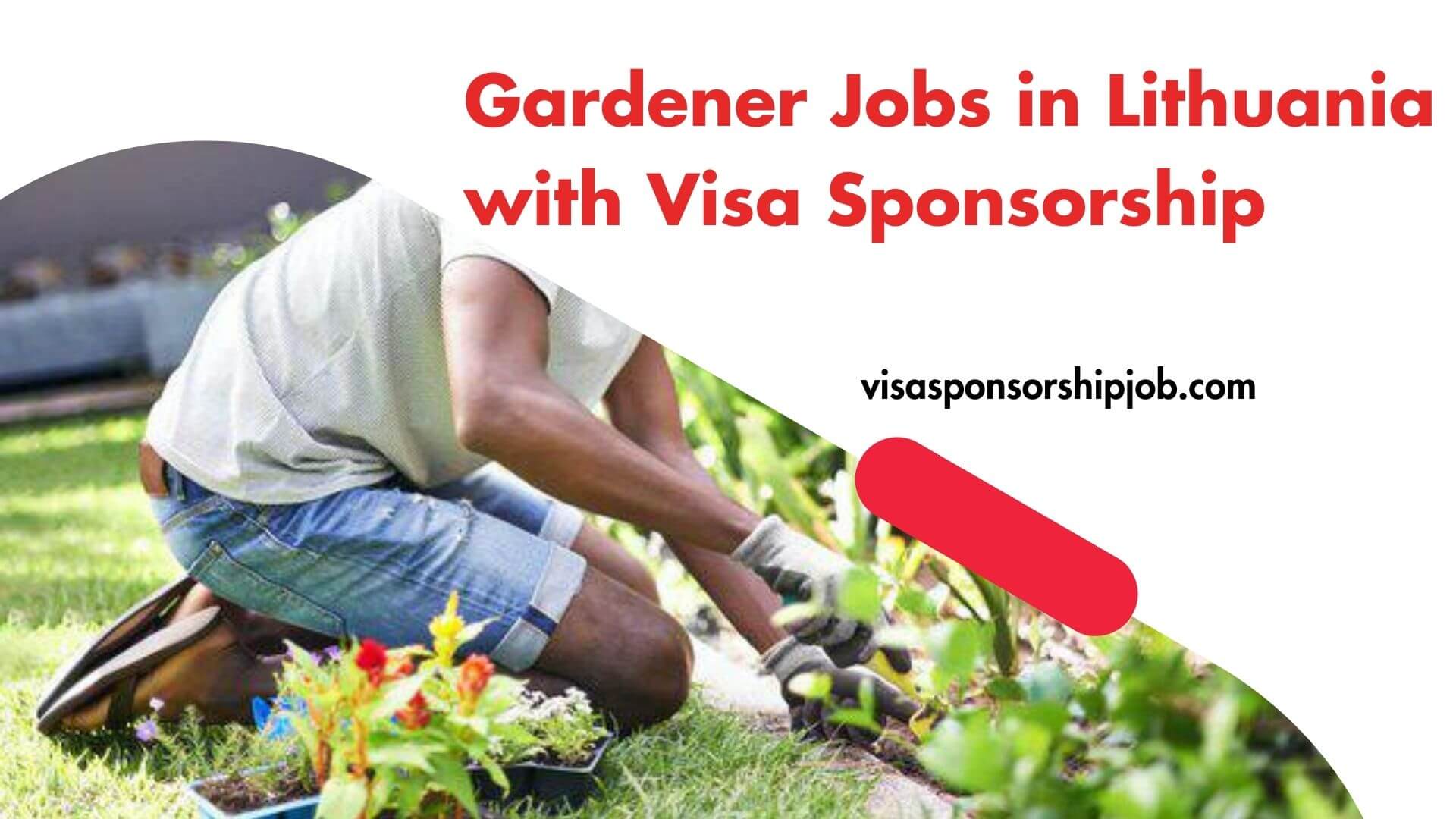There are many beautiful parks, gardens, scenery, road grass art, and other things in Lithuania. But since it joined the EU in 2004, its young people are more interested in STEM careers. So, Poland needs people from other countries to work as gardeners, farmhands, dairy workers, and in other traditional, unskilled, or semiskilled jobs. Another great thing about this job is that you don’t need any training to do it; you’ll be trained and introduced to the company.
You will be paid 550 EUR per month and get full visa support. Read on to learn more about Gardener Jobs in Lithuania with Visa Help.
Key Points:
- Job Title: Gardener
- Country: Lithuania
- Expected Salary: 240.00-540.00 EUR per month
- Visa Sponsorship: Yes
- Employee benefits: Yes
- Knowledge required: No
- Experience required: No
Requirements of Gardener Jobs in Lithuania with Visa Sponsorship
- No knowledge is required.
- No experience is required.
- You should be legally entitled to work in Lithuania or the EU.
- Should work as a team.
Benefits of Gardener Jobs in Lithuania with Visa Sponsorship
- Connection with Nature: Gardening positions afford individuals the opportunity to work outdoors, fostering a sense of connection with nature and enabling them to experience the positive physical and mental health effects that accompany time spent in green spaces. This may result in decreased tension, enhanced mood, and an overall improvement in well-being.
- Skill Development: Gardening necessitates the development of a wide range of abilities, including landscaping, pruning, plant care, and insect management. Additionally, these skills can be developed and refined through employment as a gardener, where one can also gain knowledge of various plant species and horticulture techniques.
- Creative Expression: Gardening is an activity that inspires artistic expression by providing the means to design and nurture aesthetically pleasing outdoor areas. By means of plant selection, landscape design, and garden maintenance, gardening occupations afford individuals the chance to manifest their artistic prowess.
- Community Engagement: Community Engagement: Whether through residential landscaping initiatives, public parks, or community gardens, gardening frequently unites individuals. Gardener occupations may entail cooperative efforts with fellow cultivators, community members, or volunteers, thereby cultivating a spirit of unity and interconnection among the populace.
- Environmental Impact: Gardening occupations make a positive contribution to environmental sustainability through their support of verdant spaces, biodiversity conservation, and ecological equilibrium. The maintenance of vegetation, trees, and plants by gardeners contributes significantly to the reduction of soil erosion, the enhancement of air quality, and the provision of habitat for wildlife.
- Food Production: Gardener occupations may encompass the cultivation of fruits, vegetables, and herbs for food production, in addition to ornamental horticulture. This initiative fosters self-reliance, ensures food security, and provides communities with access to locally sourced, fresh produce—everything that communities increasingly value in terms of food quality and sustainability.
- Cultural Preservation: Gardening can play a significant role in the preservation of cultural traditions and heritage, particularly in nations with a long history of gardening and horticulture such as Lithuania. The preservation of indigenous plant species, traditional gardening techniques, and heirloom plant varieties is aided by gardener employment.
- Economic Prospects: Gardening can serve as a viable means for individuals to generate income, whether it be through independent contractor work as landscapers or gardeners or through employment with municipal parks departments, botanical gardens, or landscaping companies. Gardener occupations support the local economy and afford families and individuals a means of subsistence.
Read Also: Landscape Artist Jobs in Lithuania with Visa Sponsorship
Description of a Gardener in Lithuania with Visa Sponsorship
- Taking care of the soil and growing grass, as well as putting new grass and plants
- Upkeep the lawn.
- Highways and parks need care, like pulling weeds and dead grass, among other things.
- Putting in new flowers.
- Taking care of suburbs
- Take care of all the green spaces and places in Vilnius that need it.
How to Apply for Gardener Jobs in Lithuania with Visa Sponsorship?
Frequently Asked Questions:
What Are The Requirements of Gardener Jobs in Lithuania with Visa Sponsorship
No knowledge is required. No experience is required.You should be legally entitled to work in Lithuania or the EU. Should work as a team.
How much of the gap is accepted in Lithuania?
Gaps are acceptable for up to 3 years. A variety of bachelor’s and master’s degree programs are available.
What is the success rate of a Lithuanian visa?
Success Rate: The success rate of getting a Lithuanian visa from Pakistan is an impressive 98.7%, making it the easiest country in Europe to get a Schengen visa. Tourist Visa Application Process: A valid passport with three months of validity.






